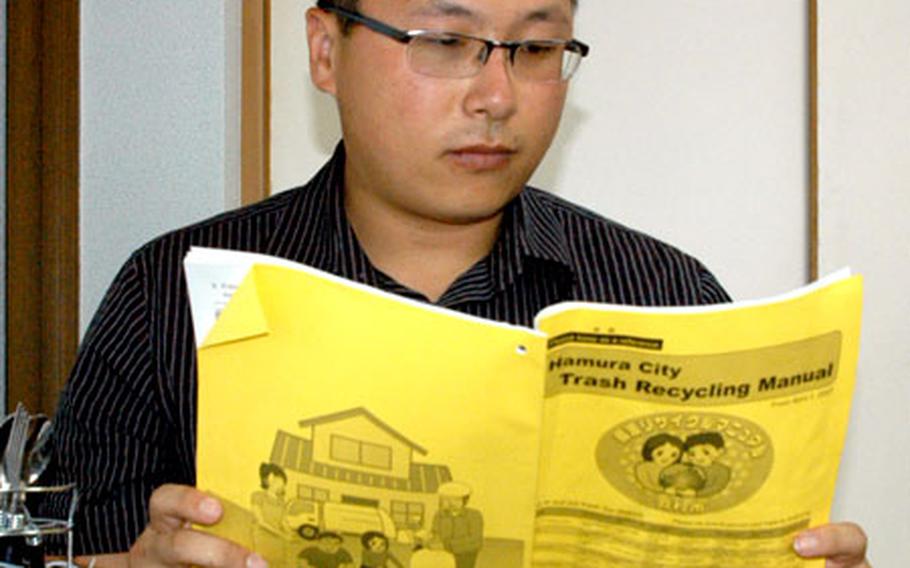
Before taking out the trash, Grant Okubo re-checks the Hamura city trash recycling manual to make sure he's putting out the correct trash items for that day. (Grant T. Okubo / S&S)
As I stepped off the plane at Narita International Airport a few weeks ago, it really hit me that I was going to live in the country that my great-great-grandparents called home.
Reconnecting with my Japanese heritage has always been one of my goals. Finally setting foot in Japan — let alone living here — is more than I could have ever imagined. You see, I’m a fourth-generation half-Japanese and second-generation half-Korean American who was born and raised in Honolulu. The joke about my ethnicity has always been that I’m at war with myself due to the history between Japan and Korea.
While Hawaii has a large Japanese community and offers many of the tastes of Japan, it is still America. So the excitement of actually living in Japan has been tempered by the stress of learning the ins and outs of its culture. In order to get the true Japanese experience, I opted to live outside of Yokota Air Base.
Being able to pass for an average Japanese citizen has been helpful. It has also presented some challenges. My knowledge of the Japanese language is limited to a few years of high school courses and two semesters in college. In hindsight, I wish I’d had done more, especially during the times when a person assumes I’m a native speaker and starts chatting away.
For instance, I’ll find myself asking a clerk, "where is this?" in Japanese and expecting one of the responses I learned in school. But the responses are never that simple, and I find myself staring blankly as I fumble for a word in response. I can only imagine what they must think. I look like them, but I don’t speak like them. Most look surprised and remorseful for their assumption. I often think if I looked more like a foreigner, they would keep their reply to the three or four simple words I know. As difficult as it’s been dealing with my linguistic shortcomings, it has encouraged me to work on my Japanese.
Driving in Japan has also been an adjustment. During my second week here, I went from watching people drive on the wrong side of the road to doing it myself as I test drove a car I was interested in buying. Looking back, I wonder what was I thinking, having my first driving experience in this country be during a test drive. Horrible images of me crashing or hitting something kept flashing before my eyes. The phrase "you break it, you buy it" kept ringing in my ears.
After that initial freak-out, I actually feel as comfortable driving in Japan as I do in the States. With that said, just because I can drive here doesn’t mean I know where I’m going. And without a good map or GPS, I’m sticking close to home for now.
Speaking of home, I remember hearing a lot of warnings about living off base. Truthfully, many seemed unimportant at the time. I can understand the concern over the fluctuations of the yen. But I really didn’t understand the actual challenge of simple things such as waste disposal. After all, how hard could it be to get rid of your trash?
Before I got here, I found the simple recycling of cans and plastic bottles progressive. Never in my wildest imaginings did I consider I’d have to look so hard at what I was throwing away. The agent for the building I live in actually gave me a manual about trash disposal. I began thumbing through what seemed like a fairly large amount of pages. I remember looking through it the first time and thinking, "How am I going to do this?" I immediately began counting the number of trash cans I’d need in my head to pull this off.
There are various categories to account for and even conditions. A single sock, for example, can go in the burnable trash. But a pair has to go out with the cloth trash. There are times I scratch my head and have no clue how to classify a certain article of trash. In the book I received, there are hundreds of products mentioned, each falling into a certain group. And there are certain items that can only go out on certain days. Just about every evening I find myself reading my trash manual to figure out which bin to put out for pickup the next morning. Admittedly, trash separation has been the most difficult adjustment. However, I do see the necessity of more efficient waste management, especially as resources and environmental concerns grow over time.
Needless to say, I’ve been sharing most of my accounts here with my family and friends. For me, the chance to finally make it to Japan is quite special and truly hits home. In high school, one of my assignments in my history class was to do a family tree. One of the most difficult parts was getting information on my Japanese side. My family had been in Hawaii for so long, and it was surprising how much information and the understanding of that information gets lost over the generations. However, with the help of my aunt and grandma, I was able to piece together a family tree.
During my tour in Japan, I’d like to reconnect with my heritage. Someday I hope to visit Hiroshima, Yamaguchi and Kuwamoto, the main areas where members of my family came from. I hope to improve my Japanese to the point where I can properly meet some of my distant Japanese relatives. That is an adventure to look forward to down the road as I start to learn what being Japanese is really all about.